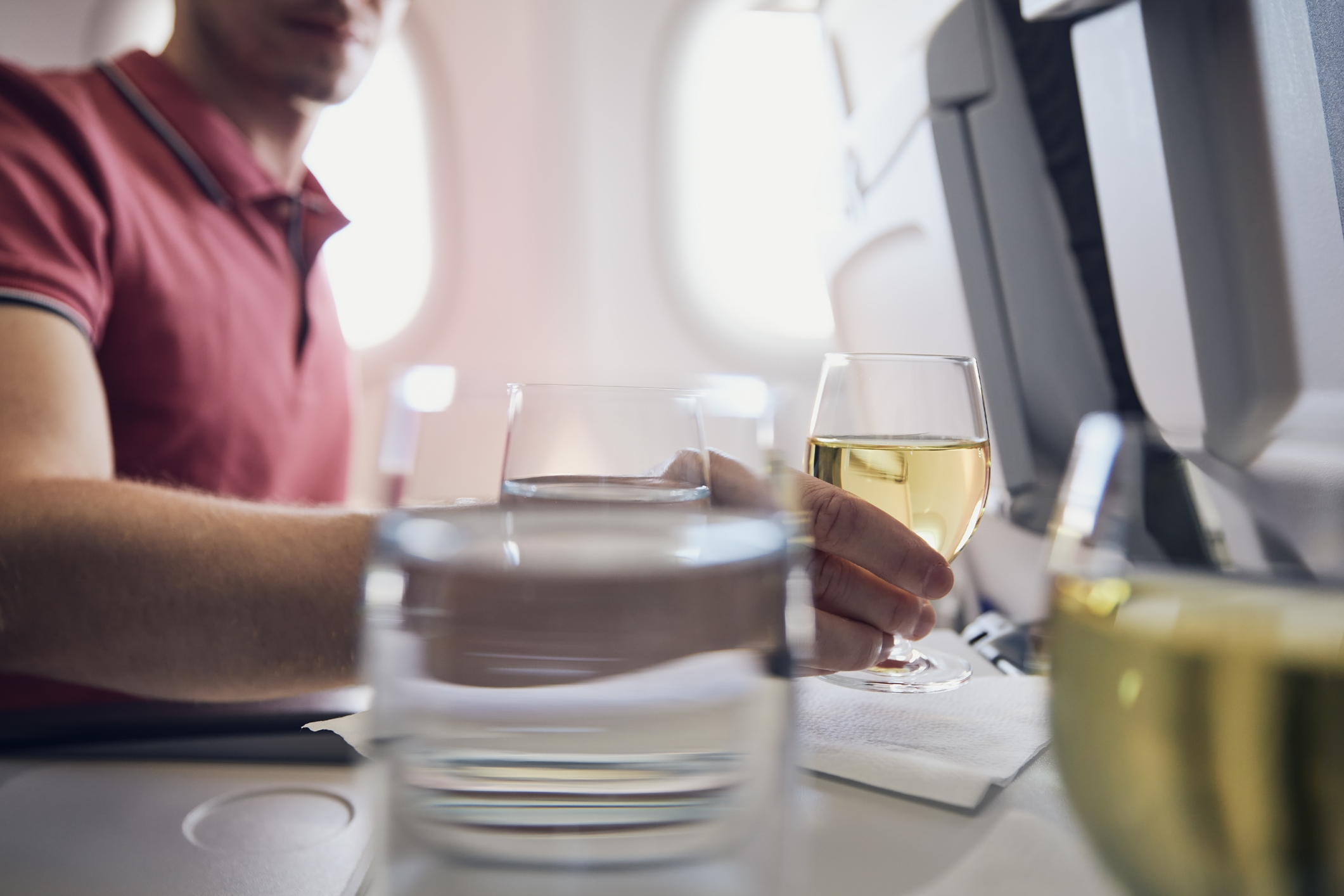

Picture this: you’re on a long flight overseas, and it’s time for the meal and beverage service.
Like many of us, you may have trouble sleeping on planes, so you order a glass of wine with your meal, thinking it will help you sleep.
Unfortunately, by doing that, you’re exposing your body to potentially dangerous effects. Here’s why…
Think twice about alcohol on a plane
It’s a common myth that alcohol helps you sleep better. While it may help you fall asleep faster, alcohol decreases the quality of your sleep by disturbing the circadian cycle, resulting in light, fragmented sleep.
To top that off, drinking alcohol on a plane can contribute to dehydration, since alcohol is a diuretic. And alcohol makes it harder for the brain to make use of oxygen, an effect that can be magnified by exposure to altitude.
Researchers from the Aerospace Medicine at the German Aerospace Center have discovered another potentially harmful effect of consuming alcohol in flight. They split 40 volunteers between two sleep lab chambers: one at a normal ground level pressure, and another designed to mimic the pressure on an airplane cruising at around 8,000 feet.
At higher altitudes, blood oxygen levels (SpO2) begin to drop, a condition known as hypobaric hypoxia.
The volunteers were divided into a total of four groups: those sleeping at normal pressure with or without having drunk alcohol, and those sleeping at cabin pressure with or without having drunk alcohol. Those who did drink were given the equivalent of two cans of beer or two glasses of wine.
During the study, participants were limited to four hours a night of sleep, likely to mimic the experience of disrupted sleep during flights.
At normal pressure, the average participant who consumed alcohol had an SpO2 of 94.97 percent and a heart rate of 76.97 beats per minute (bpm). Those who did not have alcohol at normal pressure had an SpO2 of 95.88 percent and a heart rate of 63.74 bpm.
The stats were even more worrying for those at the reduced cabin pressure. Those who drank had SpO2 of 85.32 and a heart rate of 87.73 bpm, compared to 88.07 SpO2 and 72.90 bpm for non-drinkers.
For comparison, a normal SpO2 is 90 percent, and a normal resting heart rate for adults ranges from 60 to 100 bpm depending on the individual.
Altogether, the findings suggest blood oxygen was lower and heart rate higher at airplane cabin conditions than at normal pressure — and that alcohol consumption increased those impacts.
These factors also reduced time spent in deep and REM sleep, both important for good sleep quality, but that may not be the worst of it…
Putting extra pressure on your heart
So, what does this mean for your health? A low SpO2 and a high heart rate put extra strain on your cardiovascular system. Therefore, the concern is that drinking in flight may unnecessarily increase the risk of heart problems, especially for those with pre-existing heart conditions.
It’s important to note that the study had a very small sample size and that the participants were all young and healthy. Future research can examine whether the shift in stats for the elderly and more vulnerable is even more pronounced.
Still, the researchers are cautioning people against having alcohol and a nap on a plane, especially if they have a heart condition.
“Public awareness of this topic should be raised through patient charities, public campaigns and written health advice of airlines,” the researchers write in their study. “Technical and economic constraints make it unlikely that an increase in cabin pressure will be implemented by airlines.”
It can be tempting to want to celebrate your vacation or the end of a long business trip with a cocktail in flight. But rather than drinking alcohol, consider making that drink a sparkling water with a splash of cranberry juice and a squeeze of lime. It’s still festive, and it will help ward off dehydration and poor sleep.
Sources:
Drinking Alcohol on Planes May Pose a Hidden Danger. Here’s Why. — Science Alert
What Is a Long-Haul Flight Actually Doing to Your Body? — Science Alert
Effects of moderate alcohol consumption and hypobaric hypoxia: implications for passengers’ sleep, oxygen saturation and heart rate on long-haul flights — Thorax
Alcohol & Flying: A Deadly Combination — Federal Aviation Administration
Alcohol and Sleep — Sleep Foundation
What’s a normal resting heart rate? — Mayo Clinic

